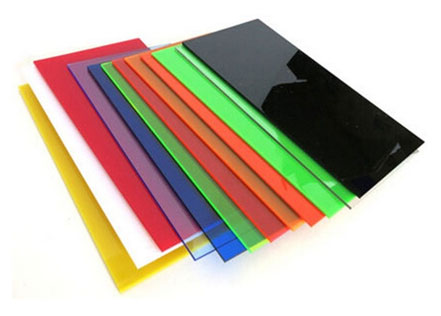Acrylic Sheets
Acrylic Sheets
Acrylic Sheets Manufacturer in India
 PDM Acrylic sheets are flat, transparent plastic sheets made from polymethyl methacrylate (PMMA), a synthetic polymer. They are commonly known by the trade names Plexiglass, Perspex, or Lucite. PDM Acrylic sheets can be clear, coloured, or tinted, and they are available in various thicknesses. It is a versatile plastic sheet with a variety of purposes and benefits, which is produced according to the extrusion process and casting process, therefore, some people call it as “extruded acrylic sheet” and “cast acrylic sheet”. This material is similar to polycarbonate sheets, but better price and surface hardness, and lower impact strength.
PDM Acrylic sheets are flat, transparent plastic sheets made from polymethyl methacrylate (PMMA), a synthetic polymer. They are commonly known by the trade names Plexiglass, Perspex, or Lucite. PDM Acrylic sheets can be clear, coloured, or tinted, and they are available in various thicknesses. It is a versatile plastic sheet with a variety of purposes and benefits, which is produced according to the extrusion process and casting process, therefore, some people call it as “extruded acrylic sheet” and “cast acrylic sheet”. This material is similar to polycarbonate sheets, but better price and surface hardness, and lower impact strength.
PDM Acrylic sheets, also known as Plexiglass, Perspex, or Lucite, are flat, transparent plastic panels made from polymethyl methacrylate (PMMA), a synthetic polymer. These sheets exhibit remarkable features such as exceptional optical clarity, making them a popular alternative to traditional glass. PDM Acrylic sheets are available in various thicknesses and can be clear, coloured, or tinted to suit specific requirements. Noteworthy characteristics include their durability and resistance to impact, making them less prone to breakage compared to glass. Despite their robust nature, acrylic sheets are lightweight and easy to handle, allowing for versatile applications. The material is also known for its weather resistance, withstanding UV radiation and other environmental factors, making it suitable for both indoor and outdoor use without significant degradation.
PDM Acrylic's moldability enables easy customization, as it can be cut, drilled, and shaped to meet specific design needs. Additionally, its chemical resistance adds to its suitability for various industries. Common applications include signage, displays, construction elements like windows, automotive components, artistic projects, medical devices, and even aquarium construction, showcasing the broad versatility and widespread use of acrylic sheets across diverse sectors. Overall, acrylic sheets offer a combination of transparency, durability, and adaptability, making them integral in numerous applications.
Key Features
Acrylic Sheet offers Optical clarity, up to 92% light transmission
50% Lighter weight than glass, but much stronger
Easy to be machined and thermoformed to any shape
Excellent chemical resistance and thermal insulation
Easy to maintain and clean
Can be coated for Surface Enhancement
Inherently UV resistant and incredible durability
The standard thickness is up to 50 mm, Max. thickness is up to 500 mm
Application
Noise Barrier
Display Box
Signage and Displays
Construction
Automotive
Art and Design
Medical
Aquariums
Hotel Supplies
Benefits Of Pdm Acrylic Sheets
Strength and Durability
Acrylic is known for its high strength-to-weight ratio and durability. It can withstand harsh environmental conditions.
Corrosion Resistance
Acrylic is resistant to corrosion, making it suitable for applications in corrosive environments, such as chemical processing plants or marine structures.
Lightweight
Acrylic is lighter than many traditional materials like steel or concrete, which can simplify transportation, installation, and handling.
Design Flexibility
Acrylic can be molded into various shapes and sizes, providing designers with flexibility in creating custom components.
Reduced Maintenance Costs
Due to its corrosion resistance and durability, Acrylic components often require less maintenance compared to traditional materials.
Long Service Life
Acrylic materials can have a long service life, leading to cost savings over time.
Versatility in Applications
Acrylic is used in a wide range of applications, including construction, automotive, aerospace, marine, chemical processing, and more.
Environmental Resistance
Acrylic can resist exposure to chemicals, UV radiation, and harsh weather conditions.
Construction
Acrylic is used in construction for components such as panels, decking, and structural elements.
Automotive and Aerospace
Acrylic is used in the manufacturing of lightweight and durable components for vehicles and aircraft.
Chemical Processing
Acrylic is suitable for applications in chemical plants, where resistance to corrosive chemicals is essential.
Infrastructure
Acrylic is used in various infrastructure applications, including bridges, pipes, and water treatment systems.


